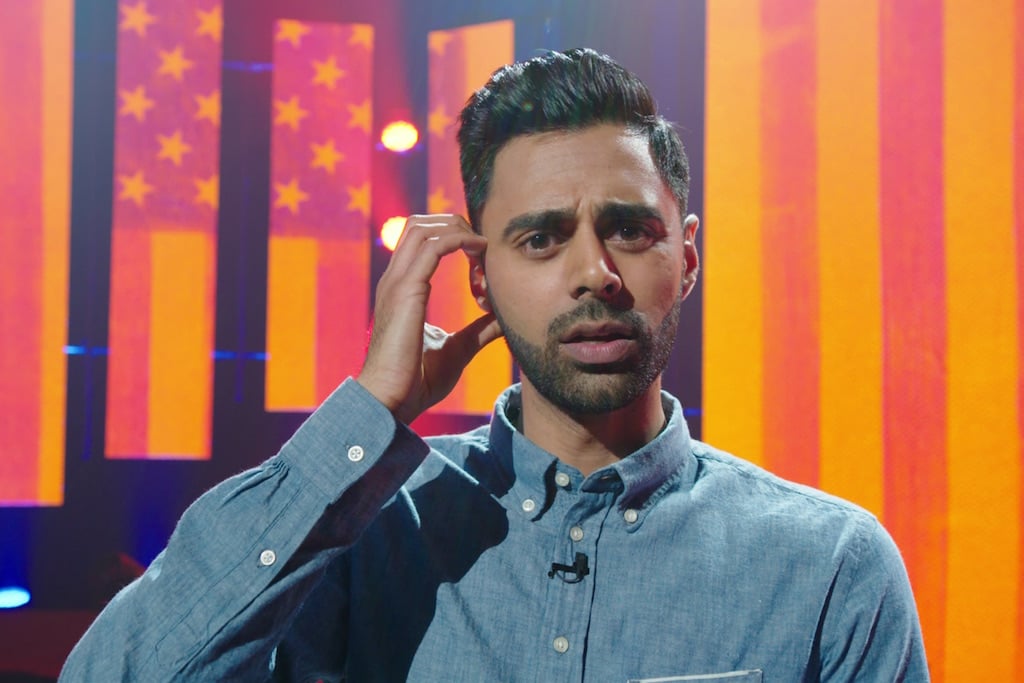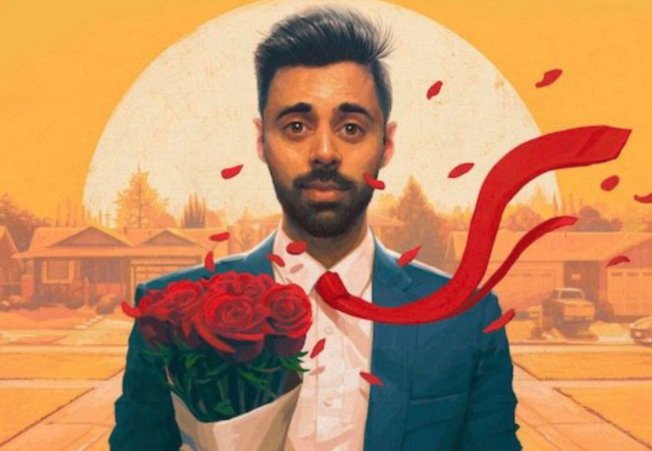The Bittersweet Genius Of Hasan Minhaj’s ‘Homecoming King’
"As a young Indian-Australian migrant, Homecoming King is deeply self-affirming."

Hasan Minhaj is riding a wave of success. A senior correspondent on The Daily Show since 2014, Minhaj has served under the helm of the comedic heavyweights Jon Stewart and Trevor Noah. He exudes a preppy California charisma, and a wholesome rom-com handsomeness which serves as a foil for his razor sharp humour. He has a disarming ability to flash a megawatt smile while delivering uncomfortable truths.
As the host of this year’s controversial White House Correspondents Dinner, Minhaj delivered a scorching 25-minute excoriation of Trump which ended on an impassioned defence of American values. “Only in America can a first-generation, Indian-American Muslim kid get on this stage and make fun of the president: the orange man behind the Muslim ban.”
Now, Minhaj’s off-Broadway show Homecoming King has been adapted to a comedy special on Netflix. The show explores Minhaj’s experiences growing up as a brown kid in monocultural ‘90s California and his struggle to fit in with the overwhelmingly white, privileged “Ryan Lochte crowd” at his school.
Like Aziz Ansari’s Master of None, Homecoming King presents a delicately constructed portrait of the migrant family and questions the mythology of the American dream. Minhaj and Aziz Ansari share a comedic sensibility; they have a swaggering onstage persona and cultivated brashness. Like Ansari, Minhaj’s comedy is replete with pop culture references (Homecoming King’s eclectic roll-call includes Voldemort, #blessed, Soul Cycle and an uncannily precise Drake impression).
As a young Indian-Australian migrant, Homecoming King is deeply self-affirming. Minhaj perfectly captures the experience of being a ‘third culture kid’ and the difficulty of navigating a hyphenated identity.
A Story Worth Telling
Growing up, I always felt invisible in the cultural landscape; I craved complex depictions of people who looked like me. South Asians were always reduced to crude stereotypes; Apu on The Simpsons or Peter Sellers in The Party. This erasure made me feel as though I didn’t exist; like my story wasn’t worth telling.
With the emergence of performers like Minhaj, it feels like there are finally cracks in the ivory tower of whiteness. In particular, there is a gradual shift in the representation of South Asian men, beyond the caricature of ‘faceless terrorist’ or ‘desexualised nerd’. This year the internet had a collective meltdown over Dev Patel’s luxuriant mane in Lion; Riz Ahmed had a hilarious turn as a ditzy surfer on Girls and Kumail Nanjiani is the leading man in rom com The Big Sick.
Homecoming King arrives at this watershed cultural moment; as the diversity of South Asian stories increases, the burden of representation eases. This creates a space for greater specificity and nuance, and a more authentic kind of storytelling.
Minhaj’s show opens with a retelling of his parent’s migration to the US from Aligarh, a small town in India. With the aid of a Powerpoint presentation, he guides the audience through his fraught childhood relationship with his father — an authoritarian figure who took him to Home Depot for his sixth birthday (“You get to pick a door handle for the bathroom”).
Minhaj jokes about his father’s emotional distance, riffing on the dissonance of being asked, “So, what do you like?” by a friend’s parent. A teenage Minhaj is utterly at a loss and answers “No one has ever asked me that before”. It is not until years later that Minhaj is able to recognise his father’s fragility; the fundamental loneliness of migration.
This theme of father-son conflict serves as the moral core of the show. Unlike other South Asian comedians (Russell Peters being a notable example), Minhaj never resorts to using the Indian accent as a punchline. Instead, Minhaj ties in his father’s inscrutability into a larger narrative about the “conditional love” of immigrant parents and their attempt to mould their children into “little Kobes”; steely-eyed and overachieving.
At one point he plays a clip of the unblinking 13-year-old Arvind Mahankali winning the National Spelling Bee, flashing to the faces of his expressionless parents in the audience.
As a South Asian migrant, I found Mahankali’s cagey resilience deeply familiar; second generation kids often face extreme pressure to justify their parents’ sacrifices. I have always felt a cultural divide between myself and my white friends who believe in “following your dreams”. I can never fathom their easy, natural confidence. From a young age I had an implicit understanding that academic success was a non-negotiable. I worked towards goals with a single mindedness; attending an elite university, pursuing a lucrative career. Minhaj jokes about his father’s similarly stern expectations (“You can have fun when you’re at med school!”).
At the heart of Minhaj’s show is the concept of “Log Kya Kehenge?”, which translates to “What will people say?” This is a universal concern, but it has a particular resonance within migrant communities. He describes his parents’ reluctance to him marrying a Hindu girl (Minhaj is Muslim, and he aptly describes the Hindus and Muslims as the “Montagues and Capulets of India”).
There’s a deep associative shame in revealing an “ethnic side”.
I found myself cringing with recognition; my parents had the same reaction when they met my white boyfriend, the same fear of backlash from the brown community. In my case, there was the added dimension of gender; as a South Asian woman, the politics of respectability are particularly unforgiving. Dating a white person is a kind of exile. It can limit your dating options within the Indian community.
For the first few months, I felt like a beleaguered defence lawyer preparing for a trial; compiling evidence, producing character witnesses, constructing arguments. Ultimately, over time (like Minhaj’s parents) they have demonstrated an open mindedness — a gradual acceptance.
Homecoming King captures the contradictions of Minhaj’s upbringing; the difficulty of navigating his strict home life while surrounded by permissive freedom. This ‘code-switching’ is captured by Minhaj’s choice to do parts of the show entirely in Hindi. The audience is exposed to the deep associative shame he felt when revealing his “ethnic side” — the feeling that he was opening himself up to ridicule. In the past I have felt the same reluctance about wearing my traditional Indian clothes (the sari, salwar kameez, bindi) in white-dominated spaces.
Minhaj’s version of the American dream needed a ‘co-sign’ by whiteness; he desperately craved the approval of “Cody, Corey and Cole”, but most of all, his teenage infatuation, Bethany Reed. True to the ‘00s zeitgeist, their relationship began on MSN Messenger, with Bethany soon becoming Minhaj’s best friend/crush. With masterful precision, Minhaj unravels a devastating story of teenage heartbreak, centred on a quintessentially American rite of passage: prom.

“The Audacity of Equality”
Homecoming King is also set against the fabric of a larger narrative about being Muslim after 9/11. Minhaj shares comedy DNA with African American greats like Richard Pryor, Dave Chappelle and Chris Rock, he is able to present the personal as political. He never confronts the spectre of Trump directly. Rather, he translates broader political issues (“the Muslim ban”, police brutality, rising xenophobia) into tangible, everyday experiences of racism.
Racism can sometimes be the relentless and exhausting justification of your existence.
Minhaj explores how racism exists on a spectrum. On one extreme, the collateral damage of racism is death (“Our African American brothers face having their spine shattered in the back of a police van”), but Minhaj explores how bigotry can exist in many different shades. People can be bigoted when smiling at you. Racism can sometimes be the relentless and exhausting justification of your existence (“As an immigrant, you are always auditioning to prove how much you love this country.”)
Minhaj tells the wrenching story of his father’s stoicism when their family car was destroyed on September 12, 2001 (“My dad swept the glass on the street like it was some hate-crime barbershop”). His father believed that they were paying “the American dream tax”. “If it doesn’t cost you your life, you pay it,” he said. Minhaj contrasts this with his own righteous fury and belief in “the audacity of equality.”
Homecoming King is ultimately about duality and reconciliation. Minhaj is trying to find a balance between his father’s worldview and his own outlook. For Minhaj “the pendulum swings back and forth” between optimism and pragmatism, freedom and obligation, anger and forgiveness. Minhaj is caught between Hindi and English, California and Aligarh, Americanised Hasan Minaj and desi Hasun Minuj.
Homecoming King creates a space where these tensions can co-exist, and transforms this dilemma into a fresh, insightful and deeply human comedy.
–
Homecoming King is on Netflix now.
–
Rhea is a writer and spoken word poet. Her work has been published in Voiceworks, The Lifted Brow and Overland among others. She constantly retweets gifs of Dev Patel at @rheaviewmirror.
